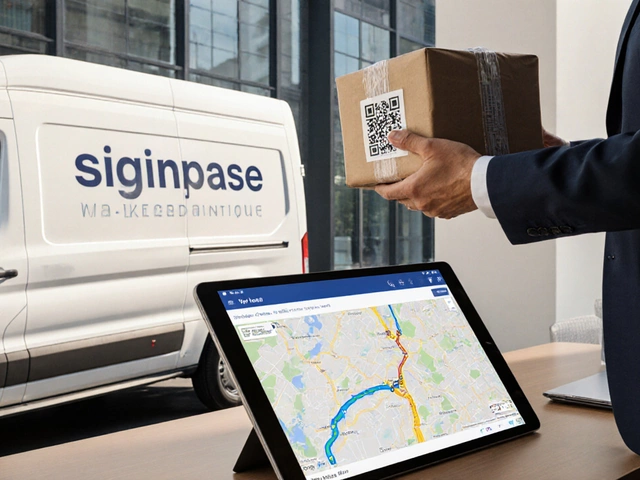If you’ve ever tracked a lost package, been baffled by a sudden delivery delay, or struggled to make sense of why your online shopping cart’s ETA keeps changing, you’ve had a tiny bite of the stress buffet that logistics folks face daily. But what happens when that’s your job? What if your whole day is spent battling trucks stuck at the border, juggling order deadlines, or hunting for a missing pallet of phone cases worth thousands? For the people who keep the world’s stuff moving, stress is more than a buzzword—it might as well come with the job description.
The Reality of Stress in Logistics Jobs
Logistics might look invisible, but its pressure is anything but hidden to the people inside the engine room. Let’s be clear: stress isn’t just about having a busy day. In a 2023 Freightwaves survey, 77% of logistics workers said they regularly feel "very" or "extremely" stressed at work. Why? Disruptions are constant—think weather, port strikes, lost documents, software glitches, late shipments, and, yes, angry customers whose big order is now missing in action. There’s never really a break; it’s a world where five minutes can make or break your entire day.
The sense of time crunch in this industry is like nothing else. Shipping schedules shift in minutes, not days. Everyone—from a warehouse clerk to a freight broker—is racing a clock they can’t see, often waiting for one domino to fall before the rest of the line moves. Then there’s unpredictability. Trucks run late, suppliers miss deadlines, customs finds a paperwork issue, or someone in the chain gets sick. It’s a jigsaw puzzle where the pieces keep changing shape.
It’s also a world full of responsibility and high stakes. When you’re in logistics, mistakes cost. Not abstractly, but really: lost goods, ruined shipments, major clients on the line, even food spoilage if deliveries are late. In 2022, companies lost nearly $100 billion globally from supply chain disruptions. That’s not just a number on a spreadsheet for a logistics manager—it’s an actual source of pressure, especially when your decisions can ripple out to stores, hospitals, or factories waiting on that one container.
Common Triggers: What Turns the Heat Up?
So, where does the pressure come from? First and foremost, it’s the unpredictability. Hurricanes, traffic accidents, sudden customs holds—it’s like herding cats on a moving train. And then, thanks to technology and online shopping, customers expect instant tracking updates and near-perfect delivery timelines. A delay of even two hours can set phones ringing, emails pinging, and tempers flaring.
Volume spikes are another monster. Did you know that during Black Friday week, some fulfillment centers handle 10 times their normal package volume? Imagine prepping for that kind of chaos, knowing there’s no way to fully control each moving part. Plus, logistics lives between silos: drivers, shippers, suppliers, buyers, IT—each speaks their own language and works at their own speed. If anyone lags, the whole system clogs up in minutes.
Then there’s the non-stop communication. It’s not unusual for someone in logistics to get 200 emails and 40 phone calls a day, from crises to updates to requests for information that they may not even have. Being the go-between means every fire ends up at your door. Some staff say it’s "like being in a live chess game, but the rules keep changing and the clock never stops." Actual quote.
Mistakes, big or small, have serious consequences. Maybe that’s why turnover is so high—industry studies say up to 36% of logistics pros quit within their first 18 months. Burnout is common, and more than half admit they suffer from frequent sleep problems tied directly to workplace stress.

Why Some Thrive Despite the Stress
It might sound strange, but a lot of people love working in logistics—even with the intensity. For some, the fast pace is addictive. Every day brings new puzzles, and solving them can be genuinely rewarding. Many logistics veterans brag about the satisfaction of pulling off impossible saves: getting a medicine shipment through customs after hours, rescuing a truckload from a storm, landing a major contract by delivering ahead of the deadline.
This isn’t just luck or personality. It's partly about training: successful logistics teams build detailed plans and back-up plans (and usually, back-ups for those). They become experts in anticipating trouble. Experience teaches you what could go wrong, and how to spot early warning signs—a truck’s route that looks too long, an email from a supplier that feels off, or even just a feeling that a port will back up during Lunar New Year.
Strong communication skills are also a weapon against stress. The best in the field know how to get quick answers, keep stakeholders informed, and de-escalate tense conversations before problems snowball. They’ll tell you: never promise what you can’t deliver, and always communicate bad news quickly. Transparency, over time, tends to build trust—even with clients who are angry right now.
As for teamwork, it’s not just a nice-to-have. Logistics is full of unsung heroes—the forklift driver who spots a mislabeled pallet, the dispatcher who finds alternate routes at dawn, the customs broker who catches one missing form before it stalls an entire container. No one does this job solo for long. The most resilient companies celebrate small wins and make space for people to breathe, even if the clock’s ticking.
Real Tips for Managing Stress in Logistics
Nobody can make stress go away entirely, but there are ways to survive (and even thrive) in this field. Here’s what actually works for people who’ve been through the wringer:
- Prioritize ruthlessly: With a million things coming at you, knowing what truly matters in the next hour stops overwhelm. Make a daily list, keep it short, and be ready to adjust fast.
- Embrace technology—but only what saves time, not what adds another layer of headaches. Tools like real-time GPS tracking and inventory software give you eyes everywhere, which means fewer surprises if you use them well.
- Set boundaries on communication. If possible, block out "power hours" where you attack urgent issues, then respond to less critical emails in batches. Some managers swear by turning off non-emergency notifications for 60 minutes at a time.
- Build relationships with key contacts—drivers, warehouse teams, customs agents. A ten-minute coffee chat today can save you hours of agony later when you need a favor or urgent info.
- Take stress breaks that actually work for you. No, you don’t need a fancy meditation app—just stand up, stretch, step outside, or swap a meme or joke with a coworker when tensions are high. Even five minutes counts.
- Ask for help early. Logistics can crush lone wolves, but teams that share problems usually solve them faster. If you’re stuck, pull in someone who’s handled the same problem before.
Studies back this up. A 2024 report found that logistics teams who set clear priorities and use tech efficiently see a 40% drop in peak stress days. Companies that check in on employee wellbeing (even with just a quick "how are you holding up?" each week) have much lower rates of burnout and sick leave.

Is the Stress Worth It?
This isn’t a yes or no question—the answer really depends on who you are and what rewards make you tick. For some, the adrenaline and challenge make logistics feel less like a job and more like a high-stakes game. Pay in logistics has been rising more than in other industries—median salaries for freight managers and logistics coordinators grew by 8% from 2022 to 2024, according to the U.S. Bureau of Labor Statistics.
The field is hungry for people who can handle pressure and bring new ideas. Many logistics professionals climb quickly into management jobs, and the skills are portable—crisis management, rapid problem-solving, and negotiation work anywhere. People who handle stress here often say they feel prepared for almost anything else life throws their way.
But if the constant urgency feels soul-crushing, it’s not the right fit, and that's OK. Good companies are starting to notice: more are investing in mental health resources, flexible shifts, and mentoring programs to help retain people. Whether you’re cut out for the heat or just want to understand what really happens behind the scenes, one thing’s clear—logistics is never dull. The next time your package lands early (or gets rerouted mid-transit), try picturing the bustling, beating heart of a supply chain pro, giving a cheer—or a sigh of relief—on the other side of your screen.





